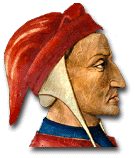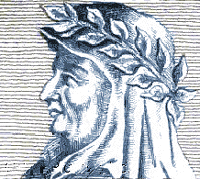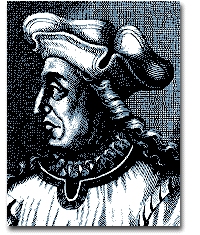| HOME |
Renaissance Literature
The visual arts were not the only place where creative and innovative ideas flourished. In the field of the literary arts, a great interest in human affairs developed ranging from scholarly works to political essays to raunchy tales of indulgence. More than any other field, it is the writing of the Renaissance that reveals a "rebirth" of Ancient Greece and Rome. Those interested in the writings of Ancient Greece and Rome became known as humanists. Humanists sought to recover ancient texts and imitate their style and values. Renaissance scholars studied the humanities or subjects relating to humans: history, poetry, rhetoric, grammar, government, and ethics. Humanists wrote in Ancient Latin but also translated their works into the vernacular, the local language. Dante Alighieri's (1265-1321) Divine Comedy stands as one of the earliest major works written in the vernacular language Italian. The invention of moveable type and the printing press made this new vernacular literature available to a larger portion of the population.
Francesco Petrarch (1304-1374) sometimes known as the "Father of Humanism," wrote extensively, praising the Ancient Romans and going so far as to write poetry in the style of the Roman epics. Petrarch frowned upon the works of the Middle Ages as did many other humanists. Another humanist, Lorenzo Valla (1406-1457) critically examined a historical church document, the Donation of Constantine, and proved it to be a forgery. Through his meticulous research, Valla even found errors in the Latin version of the Bible used by the Church at the time. Giovanni Boccaccio's (1313-1375) Decameron contains 100 amusing tales told by a group of ten young men and women who were hiding in seclusion from the Bubonic Plague. At times, the tales in the Decameron told of love and sexual passion and reflected the worldliness of Renaissance society.
Perhaps the most often read and studied work of the Renaissance was a political treatise, The Prince, by Niccolo Machiavelli (1469-1527). At the time, Italy was not a united country; rather, it was broken up into several small city-states that were constantly warring and competing against each other. Machiavelli, a diplomat for Florence, watched helplessly as Italy was repeatedly invaded and defeated by larger, unified countries. Machiavelli wrote The Prince as a practical guide to how a leader should rule to maintain and gather political power. Machiavelli believed that a leader needed to be both clever and ruthless to be successful. He argued that it was better for a leader to be feared than loved. People give the bond of love to a leader, and therefore this bond is weak because it can be broken by the people in times of trouble. The leader has no control over love. However, fear is controlled by the leader and therefore is a stronger bond when times are tough. Machiavelli contended that a leader sometimes needed to lie or act cruelly, perhaps killing, when necessary. Essentially, the ends justify the means. While Machiavelli wrote The Prince about Renaissance politics, his words had an eerie universality making them applicable to many other times including today. |
||||||
| MAIN | |||||||
| WEBQUEST CENTRAL | |||||||
|


